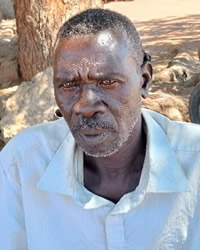Daju, Dar Daju in Chad

Photo Source:
Final Sudan
|
Send Joshua Project a map of this people group.
|
| People Name: | Daju, Dar Daju |
| Country: | Chad |
| 10/40 Window: | Yes |
| Population: | 83,000 |
| World Population: | 121,000 |
| Primary Language: | Daju, Dar Daju |
| Primary Religion: | Islam |
| Christian Adherents: | 0.00 % |
| Evangelicals: | 0.00 % |
| Scripture: | Portions |
| Ministry Resources: | No |
| Jesus Film: | No |
| Audio Recordings: | Yes |
| People Cluster: | Ouaddai-Fur |
| Affinity Bloc: | Sub-Saharan Peoples |
| Progress Level: |
|
Introduction / History
Dar Daju Daju people are distinct from the Dar Sila Daju of Chad. Though related linguistically and ethnically, the two languages do not have a high level of mutual intelligibility, and the speakers of the two languages are considered separate people groups. Daju Daju literally means 'Daju from the home of the Daju' while another Daju language variety, the Dar Daju Sila, refers to the 'Sila from the home of the Daju' in eastern Chad. The Dar Daju Daju are located in central Chad, while the Dar Sila Daju are located in the eastern part of Chad and cross into Sudan. The Dadjo language can be divided into three regional varieties. The lexical similarity between the three varieties is over 90 percent, with differences being only phonetic. The establishment of the Dar Daju Sila people group likely occurred in the early 1600's according to dates found in a manuscript by the French commander Colonel Largeau during the French invasion of dar Sila (Largeau 1913). The Daju move into Chad was said to be started by Ahmad el Daj (Largeau 1913) and eventually extended from the eastern border into what is now known as the town of Mongo in the Guéra Region.
What Are Their Lives Like?
The Dadjo generally marry others of the Dadjo ethnicity, while those in larger towns intermarry with other ethnic groups. The Dadjo are mostly subsistence farmers with some owning small businesses in the town of Mongo. Chadian Arabic is the major language of trade for the Dadjo with almost 100 percent of the adult male population speaking it on a regular basis with members of other ethnic groups. Though Chadian Arabic is the major trade language, the level of proficiency in the language is quite low in places. The author's personal observation is that the use of Arabic is most greatly felt in the town of Mongo where the intermingling of different ethnic groups is commonplace. In normal village situations the women of the village are mostly monolingual in Dadjo, and the men almost solely use Dar Daju Daju. The literacy rates are much lower than the national average for the Dadjo peoples. The Chadian government is encouraging the development of local languages and their incorporation into the education system, but it generally lacks the funding and expertise to accomplish such a task independently. The Dadjo people are very determined to see the development of their language and have taken steps toward furthering this goal. In June of 2005 they held a general assembly to which all Dadjo chiefs were invited, where the sultan of Canton Daju I, Moussa Ibedou, encouraged them to assist in the advancement of the Dadjo language. Since that time, with the aid of FAPLG, the Dadjo have formed their own language association, the Association pour la Promotion et le Développement de la langue Dadjo (APDLD) and have begun the process of teacher training for future literacy work. The primary focus of the work at the present is in the Mongo and Eref Regions with future work targeting Bardangal. There are Scripture portions now available to the Dadjo and a translation team is in place. In addition, the AET church of Chad has placed three national missionaries among the Dadjo.
What Are Their Beliefs?
Having been influenced by of Islam in preceding centuries, the Dar Daju Daju people are almost 100% Muslim, though many continue to practice long established religious customs which are non-Islamic. They believe that the One, Supreme God, Allah, spoke through his prophet, Mohammed, and taught mankind how to live a righteous life through the Koran and the Hadith. To live a righteous life, you must utter the Shahada (a statement of faith), pray five times a day facing Mecca, fast from sunup to sundown during the month of Ramadan, give alms to the poor, and make a pilgrimage to Mecca if you have the means. Muslims are prohibited from drinking alcohol, eating pork, gambling, stealing, slandering, and making idols. They gather for corporate prayer on Friday afternoons at a mosque, their place of worship. Though they are officially Muslims the Dar Daju Daju depend on the spirit world for their daily needs since they regard Allah as too distant. Allah may determine their eternal salvation, but the spirits determine how well we live in our daily lives. For that reason, they must appease the spirits. The often use charms and amulets to help them with spiritual forces.
What Are Their Needs?
The Dadjo people need to submit to Jesus Christ so they can experience the abundant life He offers them in John 10:10.
Prayer Points
Pray that the Dadjo people will have a spiritual hunger that will open their hearts to the King of kings. Pray for workers who are driven by the love and boldness of the Holy Spirit to go to them. Pray for a Disciple Making Movement among them to begin this decade.